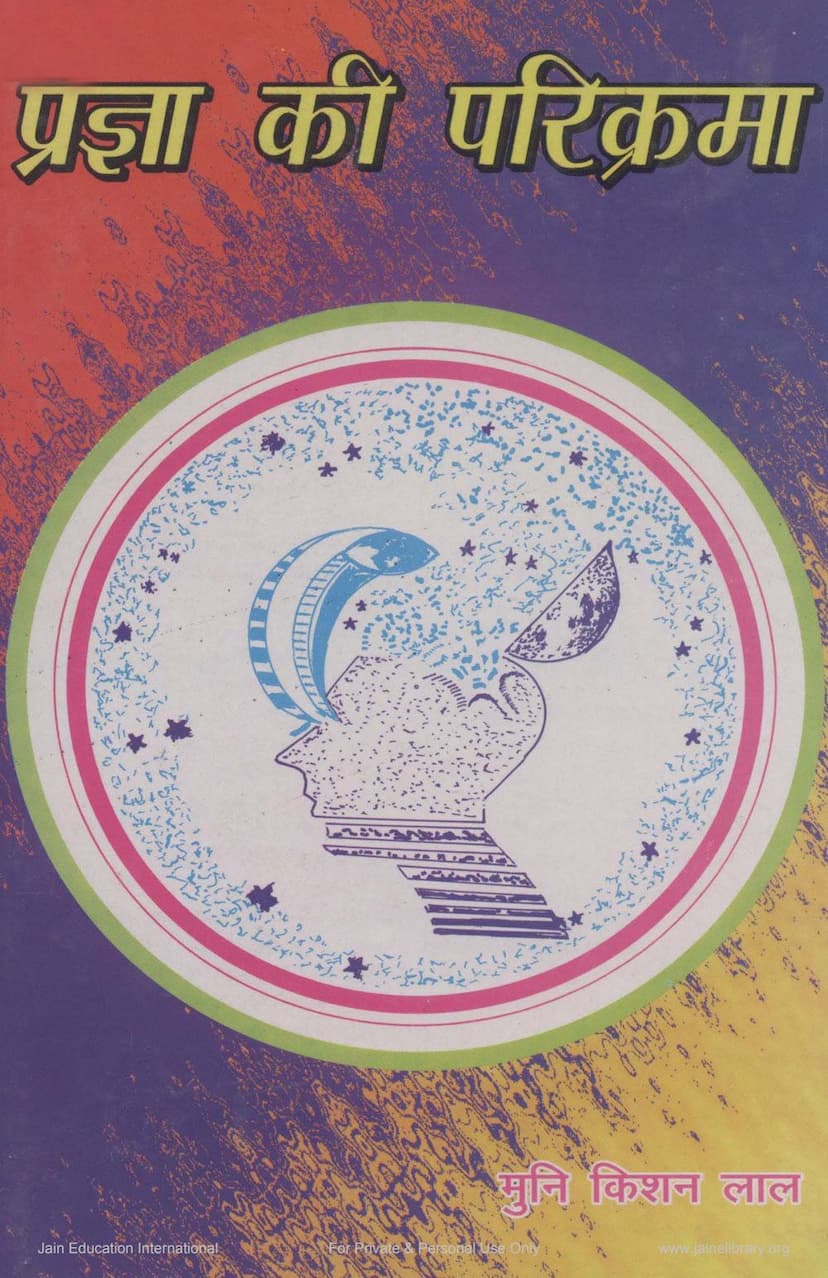Pragna Ki Parikrama
Added to library: September 2, 2025

Summary
Here's a comprehensive summary of the Jain text "Pragna ki Parikrama" (The Circumambulation of Wisdom) by Muni Kishanlal, based on the provided pages:
Core Theme: The Journey of Wisdom (Pragna) and the Practice of Preksha-Dhyana
The book "Pragna ki Parikrama" is a collection of essays and discourses by Muni Kishanlal, focusing on the concept of "Pragna" (wisdom or higher consciousness) and its cultivation through the practice of "Preksha-Dhyana" (observational meditation). The central idea is that true wisdom is not merely gained through scripture or logical inference but through direct experience and introspection.
Key Concepts and Ideas:
- Beyond Shrut and Anuman: The text emphasizes that the journey of Pragna is not limited to textual knowledge (Shrut) or logical reasoning (Anuman). It involves an attempt to "touch the existence of Pragna," which leads to the dissolution of memories, imaginations, and superficial experiences. True Pragna begins when these surface-level experiences fade.
- Pragna as Direct Experience: Pragna is described as a direct perception or realization of truth. It is something that can be lived but not fully articulated. Any attempt to describe it is merely pointing towards its light.
- The Folly of Changing Others: A significant point raised is the human tendency to try and change the external world and others, rather than oneself. This is deemed an impossible and futile endeavor. The author advocates for focusing on self-transformation through spiritual practice.
- Preksha-Dhyana: The Science of Life: Preksha-Dhyana is presented as a practical science that offers solutions to life's problems, from basic actions like breathing to complex issues. It helps individuals overcome false beliefs and sectarian dogmas. The practice emphasizes "knowing and doing" rather than blind faith.
- Self-Observation and Self-Analysis: A crucial tenet of Preksha-Dhyana is "Sampikshae Appgamappenae" – to observe oneself. This involves a thorough analysis of one's actions, duties, and adherence to essential principles. The text encourages introspection to identify and abandon negative tendencies (kayik, vachik, mansik).
- The Root of Suffering: Avidya (Ignorance): The book identifies ignorance (Avidya) as the primary cause of suffering. Understanding this leads to the path of liberation and the development of detachment (Vairagya) and wisdom (Pragna).
- The Importance of Self-Reliance in Sadhana: The text highlights that true spiritual practice is an individual journey. While guidance from teachers is valuable, the ultimate effort and realization come from within. External pressures or commands do not lead to genuine transformation.
- Critique of Superficial Religiosity: The author expresses concern about the "pathetic state of religion" where its radiance is not manifested in conduct and daily life. He argues that merely performing rituals or adhering to external practices without inner transformation is insufficient.
- The Power of Consciousness and Energy (Prana and Taijas): The book explores the potential of inner consciousness and vital energy (Prana and Taijas), likening it to atomic energy. It suggests that awakening this inner power can lead to significant transformations. The narrative of Mahavira and Gosala's power to generate heat (Taijas) illustrates this point.
- Overcoming Mental Constructs: Preksha-Dhyana aims to overcome mental constructs like anger, fear, desires, and attachments. Practices like breath awareness, body-mind stillness, and self-observation help in detaching from these mental disturbances.
- The Multifaceted Nature of Preksha: Preksha is described as a gateway to various states of consciousness, including inner peace, joy, clarity, and ultimately, self-realization. It is presented as a tool for holistic well-being, encompassing physical, mental, emotional, and spiritual health.
- Practical Techniques for Transformation: The book details specific Preksha-Dhyana techniques such as:
- Maha Pran Dhwani: A vocalization for calming the mind and enhancing memory.
- Kayotsarga: A technique of "body-abandonment" to relax the body and mind, leading to self-awareness.
- Dirgha Shwas-Preksha: Deep breathing exercises to purify the body and mind, reduce stress, and improve concentration.
- Jyoti Kendra-Preksha: Focusing on the "light center" in the forehead to calm impulses.
- Awareness (Jagrukta): Being present in the moment, which is seen as the essence of life and the path to peace.
- Anupeksha: Contemplation and reflection on observed phenomena to deepen understanding and internalize truths.
- The Role of Positive Affirmations and Suggestions: The book touches upon the power of self-suggestion and positive affirmations in transforming one's mindset and overcoming negative habits and fears.
- The Importance of Vegetarianism (Mansahar vs. Shakahar): The text advocates for vegetarianism, explaining its benefits from scientific and ethical perspectives, emphasizing compassion and the natural design of the human body.
- Personal Transformation as the Key: Ultimately, the book champions the idea that individual transformation is the key to societal change. By cultivating inner wisdom and peace through Preksha-Dhyana, one can contribute to a more harmonious world.
Author's Background and Philosophy:
Muni Kishanlal is presented as a dedicated practitioner and teacher of Preksha-Dhyana. His teachings are rooted in Jain philosophy, particularly the emphasis on self-awareness, non-violence, and spiritual discipline. He draws inspiration from prominent Jain acharyas like Acharya Tulsi and Acharya Mahapragya. His extensive exposure to various spiritual traditions and figures (like J. Krishnamurti, Mother, Sri Aurobindo) further enriches his perspective.
Structure and Content:
The book is structured into various chapters, each addressing a specific aspect of wisdom, meditation, and the challenges and solutions in modern life. The content is a blend of philosophical insights, practical guidance, and anecdotal evidence.
In essence, "Pragna ki Parikrama" is an invitation to embark on an inner journey of self-discovery and transformation, guided by the principles of Preksha-Dhyana, to attain true wisdom and lasting peace.